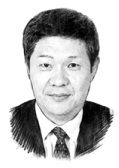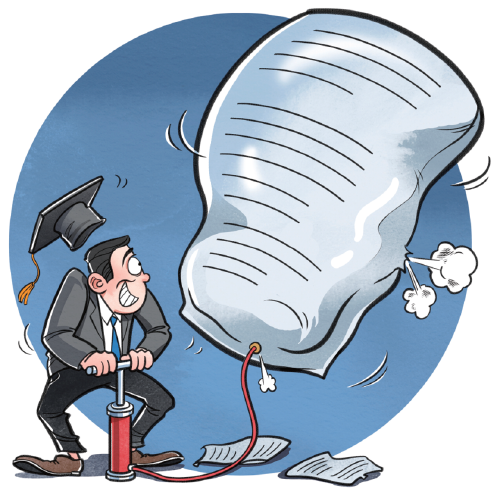Research appraisal system needs reform
Editor's Note: A so-called research paper published in the Journal of Glaciology and Geocryology, a prestigious science and technology journal, in 2013 has sparked a huge controversy almost seven years after it came to light on Saturday. The author used it to eulogize his tutor, who happened to be the journal's chief editor, and the tutor's wife. Two experts share their views on how to improve the quality of papers published in science and technology journals with China Daily's Liu Jianna. Excerpts follow:
No place for inane papers in academic journals
 Xiong Bingqi, deputy director of the 21st Century Education Research Institute
Xiong Bingqi, deputy director of the 21st Century Education Research Institute
Many already doubted the quality of some articles published by academic journals, and the revelation of the 2013 article has given credence to those doubts. Relatively unknown authors have complained of the difficulty in getting their works published, as journals accord importance to the reputation, not the research quality, of the authors. Some journals even demand that authors pay to get their works published; in fact, the money prospective authors pay is the main source of their income.
Basically, these problems are connected to the academic evaluation system, which gives too much importance to a research paper depending on whether, and where, it is published, instead of ascertaining its true quality.
In practice, the journals may ask other authors to cite each other's essay to increase the frequency of being quoted, which, for instance, could get them included in the index of core journals.
For journals that specialize in special areas, their status can hardly be challenged, and the Journal of Glaciology and Geocryology is one such publication, not least because it focuses on special subjects such as ice, snow, frozen earth and cryosphere.
The editorial board of the journal scrapped the paper and ordered an investigation into all the published articles by the author. But to uphold academic credibility and regain public trust, it also needs to address public concerns, including how can the article be approved and can the journal still be trusted.
The journal was listed among the top 100 scientific and technological journals in 2015 despite questions being raised on the publication of the paper in 2013. This, in turn, raises a question on the appraisal standard of the index and the academic merits of research papers published in the journal.
Only an appraisal system that values original research can ensure second-rate papers do not find a place in academic journals. Perhaps using peer review to assess the quality of a paper will promote original research as it will ensure genuine research is recognized by the academic world even if it has not been published or published in a relatively unknown journal. Plus, deeper reform of the scientific and technological management and appraisal system could help improve the academic appraisal system.
Research ecology must be improved
 Huang Qunhui, director of the Institute of Economics at the Chinese Academy of Social Sciences
Huang Qunhui, director of the Institute of Economics at the Chinese Academy of Social Sciences
Although China is the leading country in terms of patents and scientific papers, some of which are groundbreaking, the overall quality of these patents and papers needs to be improved, because these papers are not widely cited, and most patents just stay on paper, never to be translated into products. China is a developing country trying to become a science and technology powerhouse, which partly explains the gap between it and some advanced countries in the field of science and technology.
The journal case shows there are loopholes in China's academic appraisal system, even though it is extremely difficult to assess the quality of a scientific research paper. A paper, even without being cited by other authors, can still be groundbreaking and have immense potential for being translated into products in, say, 20 or 30 years, as scientific research itself carries a lot of uncertainties and risks.
But the shortage of precise scientific evaluation methods could prevent researchers from improving the quality of their work.
As for translating scientific research into real products, the government has introduced a series of policies, including offering incentives such as stocks, to encourage scientific researchers to use their research results to develop innovative products. As such, researchers, research institutes, manufacturers and universities should all work together to improve the scientific and research ecology and boost the innovation chain to facilitate more high-quality research.
The views don't necessarily reflect those of China Daily.















